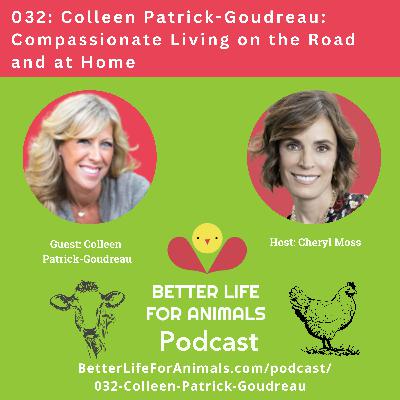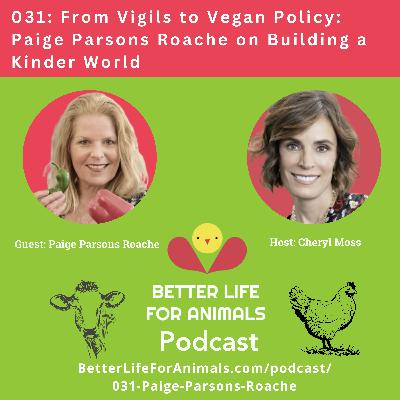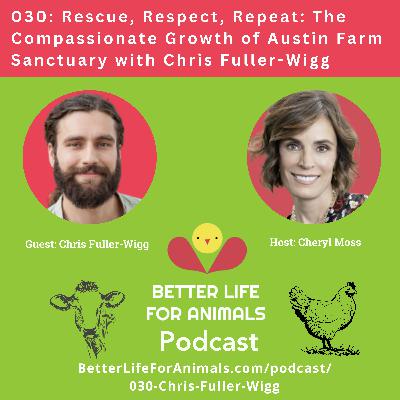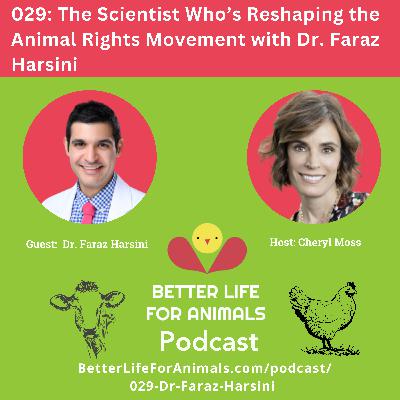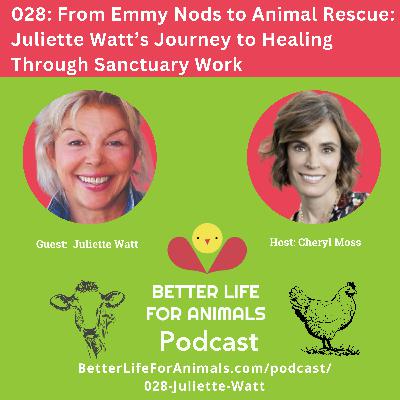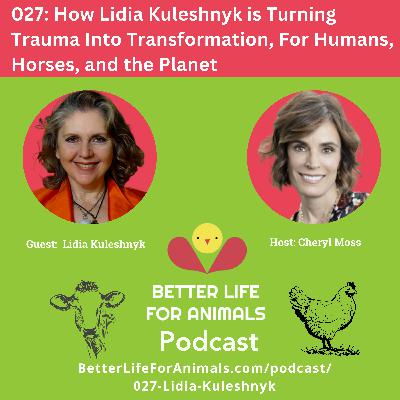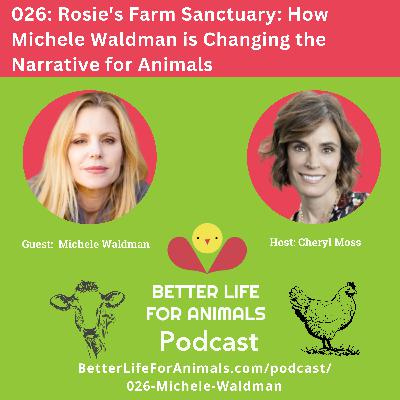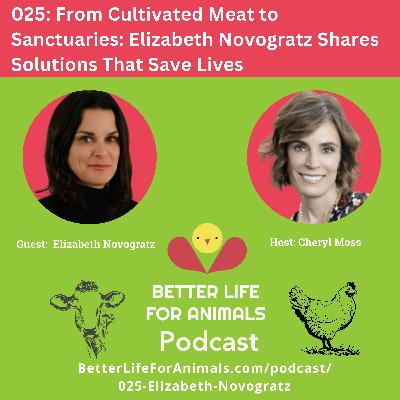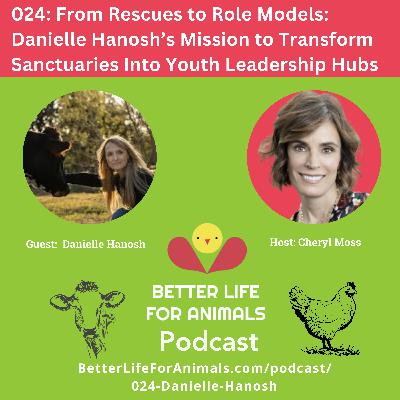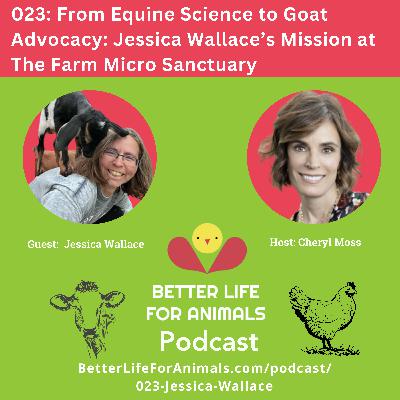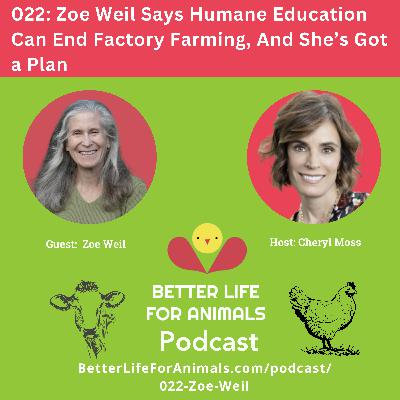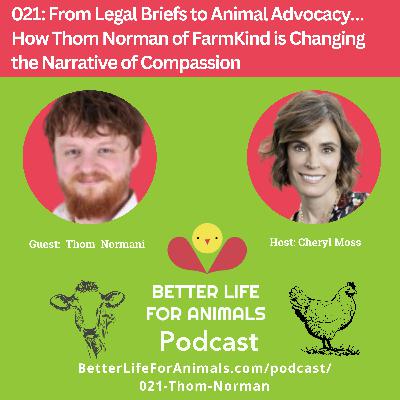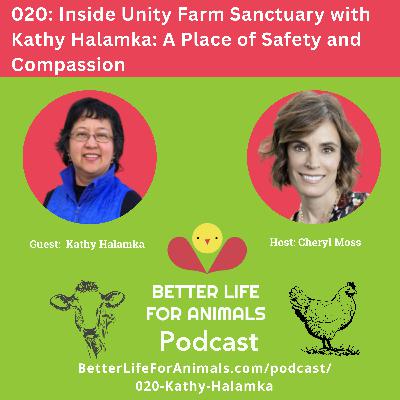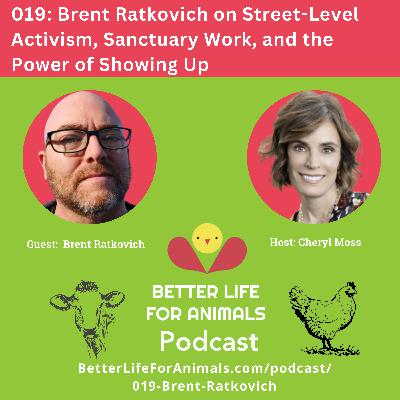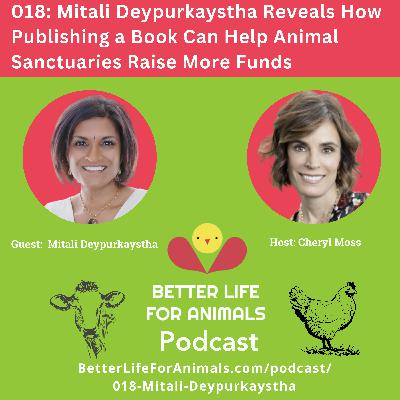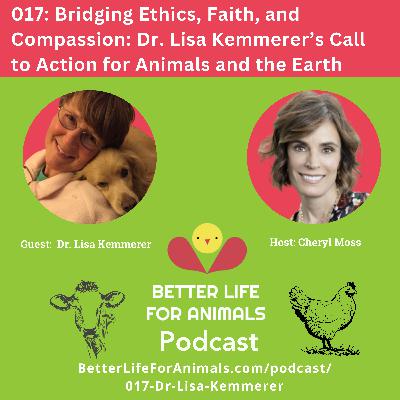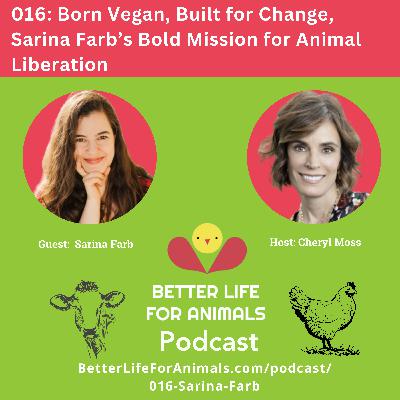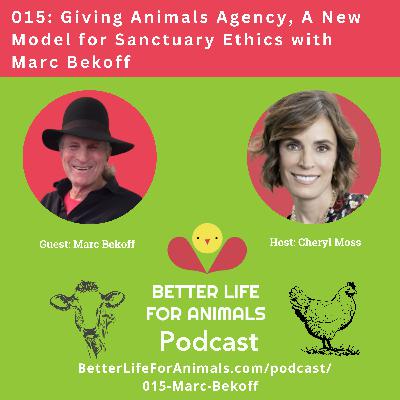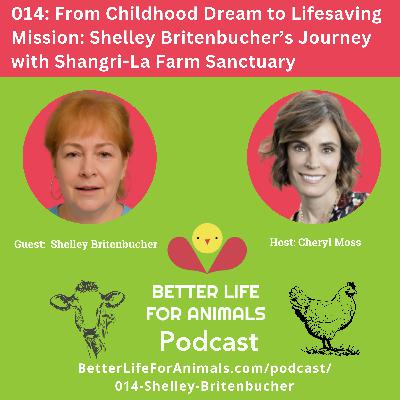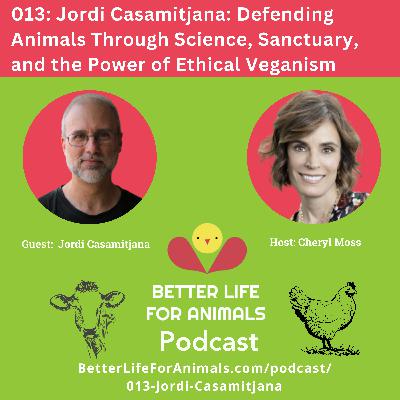Discover Better Life for Animals
Better Life for Animals

Better Life for Animals
Author: Cheryl Moss
Subscribed: 1Played: 6Subscribe
Share
© 2025
Description
Better Life for Animals is your go-to podcast for powerful stories from animal sanctuaries, vegan activists, and animal welfare changemakers. Each episode dives into real-life journeys of rescuing farmed animals, building compassionate communities, and living a cruelty-free, plant-based lifestyle.
Hosted by animal advocate Cheryl Moss, the show highlights how rescue sanctuaries across the globe give abused and abandoned animals a second chance at life. You’ll hear from nonprofit founders, vegan thought leaders, and animal rights experts who are creating a better world—one animal at a time.
Whether you're passionate about ethical living, run a small sanctuary, or simply want to support animal rescue efforts, this podcast will inspire and empower you to take action. Tune in and discover how you can help create a better life for animals everywhere.
Hosted by animal advocate Cheryl Moss, the show highlights how rescue sanctuaries across the globe give abused and abandoned animals a second chance at life. You’ll hear from nonprofit founders, vegan thought leaders, and animal rights experts who are creating a better world—one animal at a time.
Whether you're passionate about ethical living, run a small sanctuary, or simply want to support animal rescue efforts, this podcast will inspire and empower you to take action. Tune in and discover how you can help create a better life for animals everywhere.
33 Episodes
Reverse
In 1985, only 200 mountain gorillas were left in the wild. Today their numbers are growing thanks to conservation and ecotourism. In this episode, Cheryl welcomes Colleen Patrick-Goudreau, author and founder of Joyful Vegan Trips, to discuss how we can live more compassionately every day. Colleen shares why labeling food as vegan can sometimes turn people away and how focusing on flavors and ingredients makes plant-based meals inviting to all. She explains how Joyful Vegan Trips creates authentic, satisfying travel experiences with plant-based meals that celebrate local culture. The conversation also covers the importance of supporting real sanctuaries that put animals first, from elephant refuges in France to gorilla conservation treks in Rwanda. Colleen introduces her latest book, A Year of Compassion, which provides weekly actions to help people live with kindness and purpose. This episode is about practical, inspiring ways to bring compassion into daily life, whether at home, in restaurants, or while traveling. Full post at: www.BetterLifeForAnimals.com/podcast/032-Colleen-Patrick-Goudreau
A single plant-based meal can save 1,000 gallons of water. That simple fact fuels Paige Parsons Roache’s mission to build a kinder, more compassionate world. Host Cheryl Moss sits down with Paige, a full-time activist and media professional whose journey began when her daughter chose to go vegan. That decision led Paige from family cooking experiments to animal vigils, and eventually to a leadership role amplifying plant-based and ethical living through Unchained TV, grassroots campaigns, and vegan policy initiatives. In this episode Paige shares: How animal vigils shaped her advocacy Why sanctuaries create empathy and inspire change The impact of campaigns like Plant Based Treaty and Support and Feed Practical steps anyone can take to contribute to a compassionate future Paige’s message is clear. You do not have to do everything, but everyone can do something. Full post at: www.BetterLifeForAnimals.com/podcast/031-Paige-Parsons-Roache
Austin Farm Sanctuary, founded by Chris and Angela Fuller-Wigg, has grown from rescuing two goats on a half-acre to providing refuge for more than 240 farm animals on 95 acres in Cedar Creek, Texas. In this episode, Chris shares how a simple act of compassion became a thriving mission built on respect, sustainability, and community. From events like Doya Palooza to youth programs and virtual tours, discover how the sanctuary educates, inspires, and creates change for animals far beyond Texas. Full post and video at: www.BetterLifeForAnimals.com/podcast/030-Chris-Fuller-Wigg
Most people do care about animals, yet support industries that harm them. On this episode of the Better Life for Animals Podcast, I talk with Dr. Faraz Harsini about why this happens and what we can do to change it. Dr. Harsini shares his personal journey from believing animal use was "necessary" to becoming a leading voice in plant-based science and student empowerment. He outlines how Allied Scholars for Animal Protection is creating systems of change in universities across the United States. From cultivated meat to replacing animal testing with human-relevant science, this conversation is filled with practical solutions and long-term vision. Full episode at: www.betterlifeforanimals.com/podcast/029-Dr-Faraz-Harsini #AnimalRights #PlantBasedFuture #CrueltyFreeScience #AlliedScholarsforAnimalProtection #BetterLifeForAnimalsPodcast
Most people have heard of burnout. Fewer recognize it as the deeper emotional exhaustion known as compassion fatigue—a condition that can affect anyone who spends their life caring for others. In this powerful episode of the Better Life for Animals Podcast, host Cheryl Moss sits down with Juliette Watt, an Emmy-nominated writer, former ATP pilot, and long-time animal rescuer, to explore what happens when caregivers hit their breaking point. Juliette shares her incredible journey, from working at Best Friends Animal Society during Hurricane Katrina to finding healing through her deep bond with horses. Together, they discuss the emotional cost of animal sanctuary work, the importance of recognizing trauma, and how our third act in life can be filled with purpose and peace. This episode is a must-listen for anyone working in animal rescue, caregiving, or advocacy—or anyone who has ever felt emotionally depleted from giving too much. It’s a reminder that healing is possible, and that sanctuaries save more than animals—they save people too. Full post: www.BetterLifeForAnimals.com/podcast/028-Juliette-Watt
Most horses are rehomed an average of seven times during their lifetime. This instability often results in neglect, emotional distress, or a tragic end in the slaughter pipeline. In this episode of the Better Life for Animals Podcast, Cheryl Moss speaks with Lidia Kuleshnyk, also known as Lady Apona, founder of AponaHealing.com. Lidia discusses her mission to heal the disconnection between humans and nature. She explains her L.O.V.E. Method, her use of Ho’oponopono to bring healing energy to horses, and her vision for creating equine land trusts and forever sanctuaries. She also outlines the seven spiritual steps that guided her in rescuing her first horse, a process that now inspires her clients. Listeners will discover how horses can help people process grief, manage stress, and heal trauma while also learning how sanctuaries can provide the stability and reverence that every horse deserves. Full post: www.BetterLIfeForAnimals.com/podcast/027-Lidia-Kuleshnyk
Can a 5-acre sanctuary in suburbia change how we treat farmed animals? Michele Waldman says yes—and she’s living proof. In this episode of the Better Life for Animals Podcast, Michele shares how she founded Rosie's Farm Sanctuary in a residential Maryland neighborhood to bring compassion closer to home. A licensed psychotherapist, Michele uses her deep understanding of trauma to connect people with animals in transformative ways. At Rosie's, rescued farm animals become teachers, and youth become leaders through LEAP internships, immersive tours, and hands-on humane education. From pigs painting snout art to launching state legislation, this sanctuary blends joy, healing, and justice. Don't miss Michele’s inspiring journey into animal advocacy, healing, and public education. www.BetterLifeForAnimals.com/podcast/026-Michele-Waldman
More than 70 billion land animals are raised and slaughtered every year, yet most people rarely think about the individuals behind those numbers. Elizabeth Novogratz, founder of Species Unite, is working to change that. In this conversation with Better Life for Animals Podcast host Cheryl Moss, Elizabeth shares her journey from witnessing cruelty in the global animal trade to building a nonprofit media platform that inspires global action. What you’ll learn in this episode: Why 70% of Species Unite’s non-vegan audience reports reducing or eliminating animal products The promise of cultivated meat and plant-based innovation to replace animal products worldwide How storytelling can transform public perception — from misunderstood wolves to rescued orangutans The value of a judgment-free approach in animal advocacy About Our Guest: Elizabeth Novogratz is the founder and president of Species Unite, a media nonprofit dedicated to creating a more compassionate world for animals. More at: www.BetterLifeForAnimals.com/podcast/025-Elizabeth-Novogratz
Less than 3% of American students receive humane education, yet it's one of the strongest predictors of ethical leadership. In this powerful episode of Better Life for Animals, host Cheryl Moss speaks with Danielle Hanosh, co-founder of LEAP (Leaders for Ethics, Animals, and the Planet) and Blackberry Creek Farm Animal Sanctuary. A former middle school teacher, Danielle shares how her passion for education and animal welfare inspired a national movement that’s transforming farm sanctuaries into youth leadership hubs. LEAP is a compassionate alternative to 4-H and FFA, teaching students public speaking, ethical decision-making, climate literacy, and animal protection—without compromising their empathy. In This Episode: Why sanctuaries are ideal spaces for leadership development The heartbreaking truth behind traditional youth ag programs like 4-H How LEAP empowers kids to question the norm and speak up for animals Stories of student transformation—including one child who found their voice How your sanctuary can become a certified LEAP hub The importance of empathy in solving the climate, mental health, and compassion crises Danielle’s mission is clear: raise ethical leaders, not just animal advocates. Whether you're an educator, sanctuary operator, or advocate for change, this episode will leave you inspired to reimagine how the next generation learns about animals, the planet, and their own power to lead. Full post: www.BetterLifeForAnimals.com/podcast/024-Danielle-Hanosh
Most people don’t expect to find a thriving farm animal sanctuary nestled on just four acres of land in Indiana. But Jessica Wallace isn’t most people. A lifelong animal lover with a background in equine sciences and veterinary care, Jessica joined Cheryl Moss on the Better Life for Animals Podcast to share how her small but mighty sanctuary is making a big difference, especially for goats. A Lifelong Passion Sparked by Horses Jessica’s journey started with a love for horses. She earned an associate degree in equine sciences and worked in veterinary clinics for over a decade. In 2012, she bought a property so her horse could live at home. That decision eventually led to the founding of The Farm Micro Sanctuary. Goats Opened Her Heart and Her Eyes In 2019, Jessica rescued her first three goats. She was immediately taken by their intelligence, curiosity, and charm. “We’re not taught how amazing goats are,” she said. The turning point came when she took in Millie, a disabled goat from a dairy. Millie had given birth despite being unable to walk. Once her baby was taken, she was discarded. Jessica stepped in, and Millie has been with her ever since. “She’s fierce and amazing,” Jessica said. “She changed everything for me.” Full post at: www.BetterLifeForAnimals.com/podcast/023-Jessica-Wallace
Factory farming produces over 70 billion land animals every year—yet most students are never taught to question the system behind it. In this eye-opening episode of the Better Life for Animals Podcast, we sit down with Zoe Weil, co-founder and president of the Institute for Humane Education (IHE), to explore how education can be a powerful force for compassion, justice, and change. Zoe introduces us to solutionary education—an innovative, systems-based approach that teaches students to identify and solve real-world problems affecting people, animals, and the environment. From factory farming to climate change, this model empowers the next generation to become changemakers, critical thinkers, and conscious consumers. In this episode, you’ll discover: What solutionary education is and why it matters How schools can integrate humane, ethical, and environmental learning into every subject Why hope is a teachable skill, not just a feeling How animal sanctuaries play a crucial role in shifting perspectives The “True Price” lesson that reveals the hidden cost of everyday choices How cultivating solutionary thinking can help dismantle factory farming for good Whether you're an educator, activist, parent, or simply someone who wants to build a more ethical world, this episode offers a roadmap for creating real impact through education. Full post: https://www.BetterLifeForAnimals.com/podcast/022-Zoe-Weil
Can $23 a Month Offset Animal Suffering? Thom Norman of FarmKind Explains Can a small monthly donation create massive impact for animals? In this episode of Better Life for Animals, host Cheryl Moss sits down with Thom Norman, co-founder and director of Outreach at FarmKind, to explore how $23 a month can reduce the suffering caused by an average omnivorous diet. Thom introduces the concept of diet offsetting, a practical and inclusive solution for those who care about animals but may not be fully plant-based. Through FarmKind’s Compassion Calculator, individuals can measure the impact of their dietary choices and offset harm by donating to carefully vetted, high-impact animal charities. Thom shares his personal journey from corporate law to full-time animal advocacy, inspired by his own companion animals and the powerful message of The Life You Can Save. He also highlights how corporate campaigns, like the move toward cage-free eggs, are achieving real change at scale. What you'll learn: How diet offsetting empowers more people to help animals Why $1 can free a chicken from a battery cage How transparency and accountability build donor trust What makes FarmKind’s giving strategy unique and effective Why you do not have to be fully vegan to start making a difference Whether you are a lifelong vegan or just beginning your journey toward more compassionate living, this episode will show you how your dollars can do more than you ever imagined. Full post: https://www.betterlifeforanimals.com/podcast/021-Thom-Norman
Unity Farm Sanctuary in Sherborn, Massachusetts is home to over 250 rescued animals, including cows, pigs, goats, turkeys, ponies, and llamas. Founded in 2016 by Kathy and John Halamka, the sanctuary provides lifelong refuge to farmed animals while serving as a hub for humane education and community outreach. Co-founder Kathy Halamka brings her background in business and the arts to every aspect of the sanctuary. From coordinating volunteers to sharing stories through photography and writing, her hands-on leadership helps people connect deeply with the animals and the mission. Unity's residents are never adopted out. Once they arrive, they become permanent family members. For animals they cannot take in, Kathy works with other sanctuaries to ensure safe, long-term placements with thoughtful planning and support. With over 1,300 volunteers and a growing base of monthly donors and sponsors, Unity relies on community support to thrive. Fundraising efforts are transparent and mission-driven, including animal sponsorships, legacy giving, and events like Dudley Fest. Education is at the core of Unity’s work. Programs serve all ages, including the LEAP initiative, which offers students an ethical alternative to traditional 4-H and FFA programs. Tours and workshops promote kindness, compassion, and respect for animals as sentient beings. To learn more, support the mission, or schedule a visit, go to www.unityfarmsanctuary.org. Full post and other episodes: www.BetterLifeForAnimals.com/podcast/020-Kathy-Halamka
Less than 1 percent of U.S. animal product consumers ever witness the conditions inside factory farms. Brent Ratkovich is part of the small percentage who has, and he has turned that truth into tireless action. In this episode, Cheryl Moss sits down with longtime animal advocate Brent Ratkovich, whose journey from personal health transformation to frontline activism highlights the power of everyday people making an extraordinary impact for animals. From solo street protests to large-scale hen rescues, Brent’s story is a powerful reminder that when it comes to animal rights, silence is never neutral. A Spark Ignited by Compassion Brent’s vegan journey began in 2013 for health reasons, but everything changed after watching the documentary Meet Your Meat. What started as a personal lifestyle shift quickly evolved into a public mission. He began attending protests with Mercy for Animals and soon launched One Cow Army, a bold solo outreach effort designed to grab attention and plant seeds for compassion through simple signs and meaningful conversations. Taking Action Where It Matters Most Within two years of going vegan, Brent was fully immersed in sanctuary life. His volunteer work with Animal Place Sanctuary included hands-on caregiving, barn cleaning, and life-saving rescue missions. From the emotional weight of pulling hens from the brink of death to the joy of watching them dust bathe for the first time, Brent understands what it takes to restore dignity to animals who have endured suffering. He also volunteers at other sanctuaries, including Harvest Home, Blue Barn, and Welcome Home Sanctuary. His message is clear: sanctuaries need both financial support and boots-on-the-ground help to keep going. https://betterlifeforanimals.com/podcast/019-Brent-Ratkovich
Over 70 billion land animals are killed for food every year, yet many of the people rescuing them, those running animal sanctuaries, struggle with visibility, funding, and the time it takes to spread their message. On this episode of the Better Life for Animals podcast, host Cheryl Moss welcomed bestselling author and vegan book strategist Mitali Deypurkaystha, also known as The Vegan Publisher, to explore how books can amplify advocacy and help sanctuaries thrive. A Book Is Your Mission in One Powerful Place “There’s something about writing a book,” Mitali explained. “It gives people the entirety of your message in one cohesive whole.” With over 25 years in media and marketing and a client track record of over $6.5 million in revenue generated, Mitali believes a book is the most complete and enduring tool for any mission-led organization, including sanctuaries. While social media and websites have their place, they are often scattered, fleeting, and easy to miss. “Not everyone reads every blog or sees every post. But a book? People sit with it, they reflect, they connect,” she said. Heartfelt Animal Stories That Drive Support Mitali shared her own vegan awakening, which began with a rescue cat named Isha. “She taught me that animals are aware, emotional beings. That realization changed everything,” she said. Inspired by Isha, Mitali eventually adopted a plant-based lifestyle and has since helped countless ethical entrepreneurs, nonprofits, and changemakers turn their purpose into published works. For sanctuaries, she says, the best stories are often those of the animals themselves. “A donor might not remember your mission statement, but they’ll remember Daisy the pig who learned to trust again, or Benji the rooster who survived against the odds. That’s what moves people.” www.BetterLifeForAnimals.com/podcast/018-Mitali-Deypurkaystha
Animal sanctuaries are lifelines for creatures rescued from exploitation, yet their existence often remains overlooked. Pair that with the fact that fewer than 2 percent of Americans identify as vegan, and the urgency for education and advocacy becomes undeniable. Dr. Lisa Kemmerer, a global leader in animal ethics and founder of the educational nonprofit Tapestry of Peace, brought this message to life as a featured expert on the Better Life for Animals Podcast, hosted by Cheryl Moss. From Scholar to Activist: A Life Devoted to Justice Dr. Kemmerer holds a Master of Theological Studies from Harvard and a PhD in philosophy with a focus on animal ethics from the University of Glasgow. After two decades teaching at the university level, she retired in 2020 to dedicate herself fully to activism through Tapestry. Her work explores how religious belief, environmental awareness, and gender oppression intersect with the treatment of animals. Whether kayaking solo for a month or teaching students in a ranching town in Montana, Dr. Kemmerer has lived a life of immersive learning. Her extensive travel through Asia, the Middle East, and the South Pacific, including studying at the Dalai Lama’s school and staying in remote monasteries, shaped her holistic approach to animal advocacy. Animal Sanctuaries and the Power of Daily Connection Lisa’s life in a peaceful coastal setting, where she walks with her dogs daily and rescues injured wildlife from nearby beaches, speaks to her grounding in nature. “It’s essential,” she said. “Time outdoors is reflection, peace, and happiness.” Her connection with animals extends beyond academic theory into tangible acts of care. Sanctuaries, she noted, are crucial reminders of the world we must create, where animals are seen as individuals with needs, personalities, and the right to peace. Her activism includes direct rescue work and local vegan initiatives, like the Hospitality Challenge, which encouraged restaurants to add clearly labeled vegan options. “In just a couple of months, our town became much more vegan-friendly,” she said. The AMORE Framework: A Tool for Advocacy Dr. Kemmerer’s latest work distills decades of research into an accessible format with the acronym AMORE, which means “love” in Italian. It represents: Animals – Their suffering and the ethical imperative to protect them Medical – The health implications of consuming animal products Oppressions – The connection between animal exploitation and other systemic injustices Religion – How faith traditions often align with vegan principles Environment – The urgent need to protect ecosystems from the impacts of animal agriculture Designed for activists and educators alike, the AMORE model serves as a concise yet comprehensive guide for making the case for veganism in any setting. Visit: https://betterlifeforanimals.com/podcast
What is it like to be born and raised vegan in a world that normalizes animal exploitation? Sarina Farb, a lifelong ethical vegan, activist, and co-founder of the International Vegan Earth Day March, shares how she turns her values into action through education, outreach, and advocacy. She travels the country in a vegan-themed camper van, reaching millions with her message that veganism is not just a diet but a deeply rooted principle of compassion and justice. Sarina unpacks the truth about backyard eggs, fish consumption, the ex-vegan trend, and the marketing spin pushed by the meat and dairy industries. She also talks about the power of animal sanctuaries, the importance of community, and how events like the Thrive Alive Vegan Fest are helping people stay connected and committed. This episode is a powerful reminder that every choice matters and everyone has the ability to make a difference for the animals and the planet. www.BetterLifeForAnimals.com/podcast/016-Sarina-Farb
Why are 95 percent of dogs used in U.S. biomedical research purpose-bred beagles? And what does this reveal about our relationship with animals? In this compelling episode of Better Life for Animals, host Cheryl Moss sits down with renowned ethologist Marc Bekoff, PhD—author, activist, and longtime collaborator with Jane Goodall—to explore how society must shift from outdated ideas of animal welfare to a model rooted in well-being, agency, and compassion. Dr. Bekoff shares powerful insights on: Why “welfare” often justifies suffering—and what true well-being requires How sanctuaries can restore dignity through freedom and choice The role of dogs as a gateway to expanding empathy for all species The unseen emotional toll of wildlife reintroduction programs Why language matters when advocating for animals The future of compassionate conservation, where every individual counts From redefining how we view captivity—even in our homes—to inspiring the next generation of changemakers, this conversation offers a hopeful, urgent call to action. Tune in and discover how a shift in mindset can lead to a better life for all animals—and ourselves. www.BetterLifeForAnimals.com/podcast/015-Marc-Bekoff
From the moment Shelley Britenbucher stood up in her school classroom in the 1970s and declared, “I’m going to start a farm sanctuary when I grow up,” the seed was planted. Decades later, that dream became reality. During this episode of the Better Life for Animals Podcast, hosted by Cheryl Moss, Shelley shared the remarkable journey behind the founding of Shangri-La Farm Sanctuary in Litchfield, Ohio. A Childhood Vow Comes Full Circle Shelley and her husband Jeff opened the gates to Shangri-La Farm Sanctuary over seven years ago. What began with the rescue of two horses headed for slaughter,Tatanka and Maisie, quickly expanded. Soon, a donkey named Cisco joined the fold after enduring severe neglect. The sanctuary has since grown to nearly 20 residents, including senior dogs, goats, chickens, turkeys, and more farm animals needing lifelong care and love. From Vegetarian to Vegan—and Fully Committed Shelley’s transition to veganism marked a pivotal point. Though she had been a vegetarian for nearly 40 years, a deeper awakening about the plight of animals led her to go fully vegan. This shift solidified her dedication to ensuring the animals she rescues are never harmed, exploited, or rehomed unnecessarily. “They are under your care for life,” she explains, reflecting on the profound responsibility of sanctuary work. Understanding the Tenets of True Sanctuary At Shangri-La, the commitment is clear: no harm, no exploitation. That means no leather, no honey, no silk, and certainly no products derived from the very beings they work to save. “You cannot have a fundraiser and serve the very animals you’re trying to save on a plate,” Shelley says. For her, veganism isn’t optional, it’s foundational. Full post: www.BetterLifeForAnimals.com/podcast/014-Shelley-Britenbucher
Jordi Casamitjana is a vegan zoologist, animal rights activist, and author whose work spans science, sanctuary care, legal advocacy, and compassionate living. Originally from Catalonia and now based in the UK, Jordi’s journey into veganism began with an unexpected moment involving a wasp. That encounter sparked a lifelong commitment to seeing the value in all animals, no matter how overlooked. He spent five years at Wild Futures, a monkey sanctuary in Cornwall, where he cared for woolly monkeys rescued from the exotic pet trade. Later, with the Born Free Foundation, he exposed the suffering caused by animal captivity in zoos. His insights reveal how animals in captivity lose space, stimulation, and choice. In 2020, Jordi made history by winning a landmark legal case recognizing ethical veganism under the UK’s Equality Act. His book Ethical Vegan explores this journey and the broader ethics behind living without causing harm. He also introduced the concept of the “blood footprint,” urging us to consider how our choices affect sentient beings. Jordi’s life is a powerful reminder that empathy, science, and activism can come together to create real change. Full post at: https://www.betterlifeforanimals.com/podcast/013-Jordi-Casamitjana


